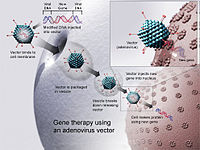
Photo from wikipedia
Stably acquired mutations in hematopoietic cells represent substrates of selection that may lead to clonal hematopoiesis (CH), a common state in cancer patients that is associated with a heightened risk… Click to show full abstract
Stably acquired mutations in hematopoietic cells represent substrates of selection that may lead to clonal hematopoiesis (CH), a common state in cancer patients that is associated with a heightened risk of leukemia development. Owing to technical and sample size limitations, most CH studies have characterized gene mutations or mosaic chromosomal alterations (mCAs) individually. Here we leverage peripheral blood sequencing data from 32,442 cancer patients to jointly characterize gene mutations ( n = 14,789) and mCAs ( n = 383) in CH. Recurrent composite genotypes resembling known genetic interactions in leukemia genomes underlie 23% of all detected autosomal alterations, indicating that these selection mechanisms are operative early in clonal evolution. CH with composite genotypes defines a patient group at high risk of leukemia progression (3-year cumulative incidence 14.6%, CI: 7–22%). Multivariable analysis identifies mCA as an independent risk factor for leukemia development (HR = 14, 95% CI: 6–33, P < 0.001). Our results suggest that mCA should be considered in conjunction with gene mutations in the surveillance of patients at risk of hematologic neoplasms. Patients with solid cancers have high rates of clonal haematopoiesis associated with increased risk of secondary leukemias. Here, by using peripheral blood sequencing data from patients with solid non-hematologic cancer, the authors profile the landscape of mosaic chromosomal alterations and gene mutations, defining patients at high risk of leukemia progression.
Journal Title: Nature Communications
Year Published: 2021
Link to full text (if available)
Share on Social Media: Sign Up to like & get
recommendations!